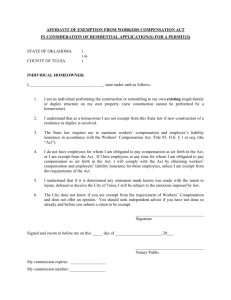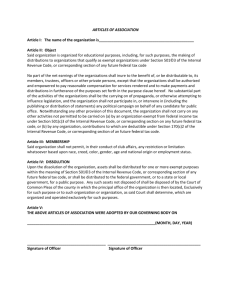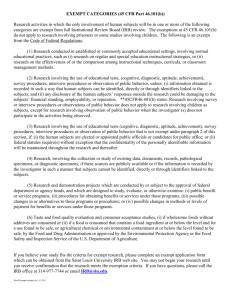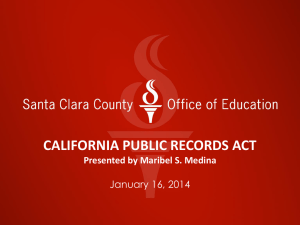Final and Revised DTF Report/Reccommendation
advertisement
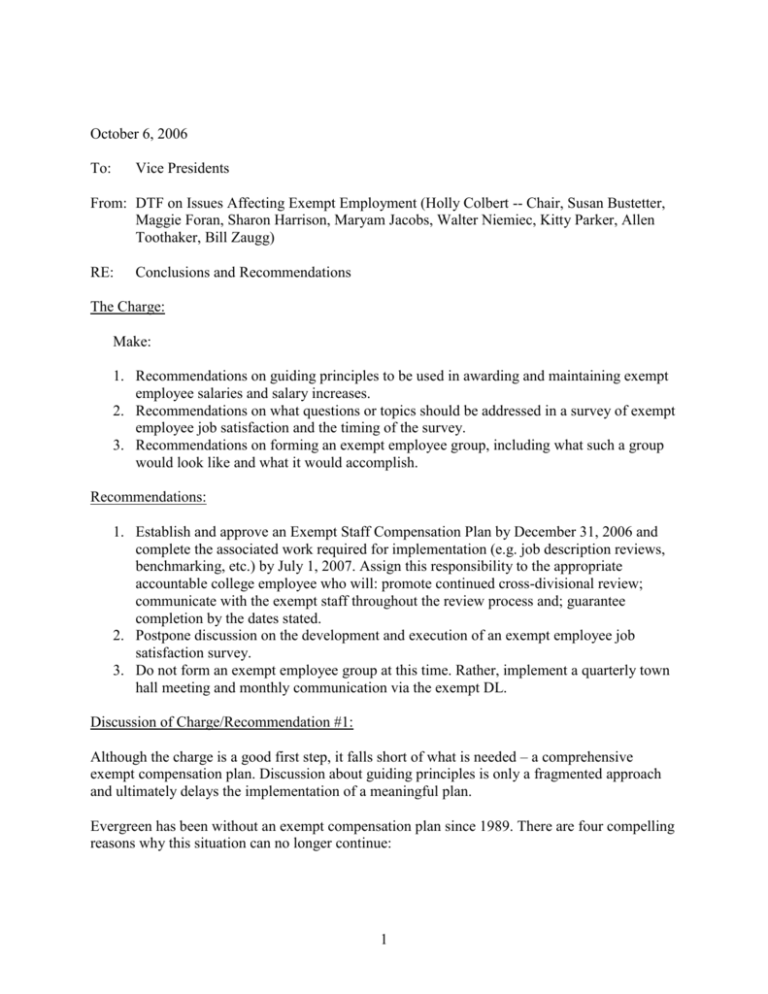
October 6, 2006 To: Vice Presidents From: DTF on Issues Affecting Exempt Employment (Holly Colbert -- Chair, Susan Bustetter, Maggie Foran, Sharon Harrison, Maryam Jacobs, Walter Niemiec, Kitty Parker, Allen Toothaker, Bill Zaugg) RE: Conclusions and Recommendations The Charge: Make: 1. Recommendations on guiding principles to be used in awarding and maintaining exempt employee salaries and salary increases. 2. Recommendations on what questions or topics should be addressed in a survey of exempt employee job satisfaction and the timing of the survey. 3. Recommendations on forming an exempt employee group, including what such a group would look like and what it would accomplish. Recommendations: 1. Establish and approve an Exempt Staff Compensation Plan by December 31, 2006 and complete the associated work required for implementation (e.g. job description reviews, benchmarking, etc.) by July 1, 2007. Assign this responsibility to the appropriate accountable college employee who will: promote continued cross-divisional review; communicate with the exempt staff throughout the review process and; guarantee completion by the dates stated. 2. Postpone discussion on the development and execution of an exempt employee job satisfaction survey. 3. Do not form an exempt employee group at this time. Rather, implement a quarterly town hall meeting and monthly communication via the exempt DL. Discussion of Charge/Recommendation #1: Although the charge is a good first step, it falls short of what is needed – a comprehensive exempt compensation plan. Discussion about guiding principles is only a fragmented approach and ultimately delays the implementation of a meaningful plan. Evergreen has been without an exempt compensation plan since 1989. There are four compelling reasons why this situation can no longer continue: 1 a. Reviewer comments from the last re-accreditation process (1998) stated: “The salary schedule at Evergreen is making it increasingly difficult to attract and maintain qualified faculty, administrators and instructional technology personnel. The committee recommends that the institution review the salary schedule and increase its efforts to seek ways to better compensate its personnel”. And again with the mid-term review in 2003: “The College must address specifically the pervasive salary problem across exempt, faculty and certain categories of classified positions in order to assure the continuing viability and quality of its programs. Progress needs to be made toward a fair and competitive salary schedule for exempt, faculty and classified positions”. In response to the Commission’s findings, a Faculty Compensation DTF was charged in 1998-99. The primary recommendation to increase faculty compensation by 20% over a four-year period was approved and partially implemented (budget cuts halted the process after the second year). Classified salaries are outside the purview of the College decision-making process. However, IT salaries were studied and the recommendation to increase this employee class was funded by the Legislature. Although exempt compensation issues were also discussed during the 1998-2000 period, the College has yet to address the Commission’s recommendation to make progress “toward a fair and competitive salary schedule” for exempt positions. b. The 2000 and draft 2006 Strategic Plans address exempt compensation as an institutional concern that must be addressed. In the 2000 Strategic Plan, Section III, Faculty/Staff Recruitment, Retention, and Vitality, paragraph #2, recommends that the College “Review and adjust exempt staff salaries and benefits so they are internally equitable and externally competitive. This will be accomplished through appropriate peer and market comparison studies, both internally and externally, during the next two biennia. Once achieved, maintain equitable and competitive salaries.” The 2006 draft Strategic Plan, though less specific, also addresses the need (overworked, underpaid, recruitment) and methodology (selected benchmarks). Although recognized as a concern in both documents, a tangible plan of action has not been prepared. c. Exempt employees have approximately doubled since 1989 (~100 to 200) and make up 28% of the current staff and faculty.1 Human Resources data show a turnover rate for exempt staff over the past two years (2004, 2005) between 11% 16%, an increase of over 50%. As of October, 2006 the exempt staff turnover rate 1 IPEDS 2006 data reports a total of 726 faculty and staff. Classified and exempt staff account for 505 employees, with 49 staff employed part-time. Of the 221 faculty, 63 are part-time. 2 is 13%.2 It is reasonable to assume that this turnover is in part associated with an absence of a competitive compensation plan. The cost associated with rehiring is high (advertising, relocation, hiring committee member time, loss of institutional knowledge). At a time of increased employee turnover and increased competition to recruit and retain qualified employees, the absence of an exempt compensation plan is a detriment to the operation of the College. d. It is the sense of the DTF that exempt staff morale has suffered. This was derived with both formal and informal discussions with the exempt staff (see staff comments in appendix A). In the absence of an exempt compensation plan, perceptions of inequity and unfairness exist. Past selective salary increases for some exempt staff members promote these perceptions. In addition, salary adjustments primarily for those positions vacated (rationale being the need to recruit qualified candidates in the current market) further disenfranchises committed employees who choose to remain in their Evergreen positions without similar adjustments. Initially, the DTF discussed guiding principles/objectives. Rather than spending much time recreating compensation principles/objectives and values already in place at most institutions of higher education, the DTF chose to examine existing policies. They include: Evergreen’s former exempt compensation plan (TESC College Policy & Procedures, February 1, 1989), Western Washington University’s Exempt Professional Staff Classification/Compensation Plan (June 30, 2000), The University of Washington’s Professional Staff Compensation Plan and various compensation information downloaded from the web. All are good examples of a reasonable compensation plan. However, if any one or some combination of plans is used, it will need to be tailored to coincide with Evergreen’s values and practices. We concluded that the following principles should guide Evergreen’s compensation plan: Administrative Effectiveness (simplicity, clarity, transparency, consistency in application) Objective and fair means of recognizing differences in qualifications and responsibilities as stated in the job description (e.g. whole job method) Equity (job responsibilities tied to compensation) both internal to the institution and external markets Competitiveness (to recruit, retain and reward qualified employees that are needed to fulfill the College’s mission) Motivation (rewards fit institutional culture and employee professional expectations) Cost Control (balance between funding the plan and staying within budget) Turnover data is collected and reported on a calendar year (January – December). Number of Exempt Staff who left Total Number of Exempt Staff 2004 21 193 2005 32 197 2006 (through October 31) 25 197 2 3 % 10.9 16.2 12.7 Government Compliance (non discrimination, Equal Pay Act, Fair Labor Standards Act, etc.) The principle of compensation tied to merit and/or longevity was also discussed. It was concluded that this should be examined by the person(s) charged to implement the exempt compensation policy as recommended. Both the faculty and classified staff compensation plans reward longevity. Implementation of a merit-based system is seemingly counter to Evergreen’s egalitarian philosophy and would be more difficult to implement and maintain. The DTF suggests that the compensation plan might include the following elements: Establish a statement of pay philosophy that explains rationale and objectives of the exempt staff pay program Update exempt staff position descriptions before market pricing Establish an exempt staff salary structure through use of both position market pricing and job evaluation (point factor, ranking, slotting, whole job method) Use multiple salary surveys to determine the market pay range for each exempt position where possible Identify specific recruitment / labor markets (e.g. higher education, industry, geographical such as Northwest, Washington, Thurston and Pierce Counties) to use for pricing each position pay range Assure internal equity through annual review of position pay rates and grant individual internal equity adjustments whenever individuals fall behind due to new hire start rate Establish process for pay progression (e.g. fixed %, % range or steps) Update the exempt staff salary structure through market survey every four years Discussion of Charge/Recommendation #2: It was felt that this charge was in response to earlier efforts by a number of exempt staff members to conduct a survey about working conditions. The DTF concluded that the central issue for most exempt employees is the establishment of a compensation plan that reflects the objectives mentioned. Efforts to survey the exempt staff at this moment are secondary to the establishment of a comprehensive compensation plan and we therefore recommend that this effort be postponed. In the Faculty and Staff Vitality section of the draft 2006 Strategic Plan, the need to conduct a regular cycle of climate surveys is noted. Perhaps an exempt staff survey could be done in conjunction with a survey that includes the faculty, if and when the 2006 Strategic Plan is adopted and implemented. We do encourage increased and continual communication with exempt staff by divisional managers concerning the development of the compensation plan and overall working conditions. Discussion of Charge/Recommendation #3: Again, the DTF concluded that the central issue for most exempt employees is the establishment of a compensation plan. Therefore, efforts to address “forming an exempt employee group including what a group would look like and what it would accomplish” are secondary. Exempt 4 employees have expressed an interest in having a formal mechanism to communicate with the college administration. An exempt employee group might accomplish this; however, the DTF believes that there are other mechanisms that could provide an opportunity for communication. A quarterly town hall meeting would provide an opportunity for all employees of the college (exempt, classified, and faculty) to gather in order to learn about issues facing the college. The town hall meeting would also provide an opportunity for college officials such as the President, Vice Presidents, or Associate Vice Presidents to respond to questions from employees. Questions could be submitted prior to or during the town hall meeting. Each month the Vice President for Finance and Administration or the Associate Vice President for Human Resources would respond to previously submitted questions via the Exempt Employees DL. Exempt employees would have an opportunity to submit questions in several different ways, thus affording them the option of posing questions anonymously. This could be accomplished by establishing a Q&A drop box in HR, or via a web-form. Summary: The next ten-year re-accreditation report is due summer 2008. Exempt compensation concerns were cited in both the 1998 final and 2004 interim reports. If this is not addressed, it is a reasonable expectation that the Commission will again cite the College for failure to address this important issue. The 2000 and draft 2006 Strategic Plans also cite problems with compensation as it relates to staff vitality and recruitment and retention issues. In response to the 2000 Strategic Plan, a DTF was charged to examine all aspects of Human Resource Services in light of turnover, growth and a competitive labor market. A specific charge was to evaluate the exempt compensation system. The Human Resource DTF (January 2001June 2002) recommended that “the college adopt a broad banding model for exempt salaries and that an exempt salary system coordinator be assigned, or a consultant be hired, to develop and implement the new process”. This recommendation was accepted by then F&A VP Ann Daley. Additionally, the Department of Personnel, upon request, prepared a report entitled “A Report Demonstrating the Use of the Exempt Management Service Approach to Evaluating and Classifying Exempt TESC Employees.” These internal and external reviews are significant. All state clearly what is needed. However, the college has yet to implement any of these recommendations in a meaningful manner. We hope that past inaction on this issue will not repeat itself. If the vice presidents accept the recommendation to implement an exempt compensation plan within the stated timeframe, the DTF strongly recommends that one college employee be assigned the responsibility for oversight and completion of the project. That individual should work closely with formally designated personnel from each division to ensure a cross divisional 5 perspective and buy in. Further, broad communication with all exempt staff throughout the development process is needed. We realize that additional project work of this magnitude might be a challenge to implement with current staff workload demands. However, we recommend that the vice presidents consider this project an institutional priority and adjust workloads of staff members assigned to this project accordingly. Employing external compensation professionals and /or consultants to expedite the process (e.g. conduct market surveys, develop the salary structure, review job descriptions, etc) is also an option. The DTF members respectfully request a written response to our recommendations by July 30, 2006. 6 Appendix A DTF Members consulted with exempt employees across the college. There were several themes that emerged during this process. Exempt employees are frustrated with the current situation regarding salary (no clear compensation plan) and cite salary related issues as the number one reason they would consider leaving Evergreen. Some exempt employees like the idea of an exempt group but there was no clear direction as to what its purpose would be or how it would work. Exempt employees enjoy working at Evergreen for a variety of reasons. It is clear that many employees are frustrated with the current salary situation. They are frustrated with their base salary and the fact that there is no apparent institutional system or mechanism to receive a raise. Several employees mentioned that their workload has increased while their compensation has not. They are also frustrated by the lack of advancement opportunities within the college. Supervisors recognize that their employees are working hard, and becoming more valuable to the organization each year, yet they have no means or method of compensating exempt members of their staff who do exceptional work. When asked if they would like to see an exempt staff organization the response by staff was evenly distributed between yes, no, and maybe (many were not sure what an organization would do). Some staff suggested that the group could be a means to improve communication and collaboration across divisions. The organization could be a place for brainstorming on a variety of issues, sharing information, and discussing various topics. It was also suggested that an exempt organization could be an alternate communication tool for exempt employee’s voices to be heard on exempt employment issues. When asked, a majority of exempt staff indicated that they felt their voice was heard; however this was not true for all respondents. When asked what they value about working at Evergreen exempt employees cited many things ranging from the beauty of the campus and its location to the mission, and philosophy of teaching and learning, and its student centeredness. They also value being part of a collaborative team, and working with very dedicated staff. The diversity of work, as well as the diversity of faculty, staff and students was also indicated. Exempt staff appreciate the flat hierarchy of the institution, as well as the flexibility in time and autonomy. Others value the opportunity to be involved in hiring committees, and the fact that their expertise and input is welcome. 7 Appendix B Below is a summary of feedback to the recommendations. The feedback was provided via email and at a public forum for exempt employees on Thursday, November 9th, 2006. COMPENSATION PLAN Formalizing a compensation plan is the best use of energy and resources. Having more regular, objective pay increases would be a good thing. It makes sense and is important for the institution to keep abreast of exempt compensation and conditions to minimize “brain drain” / turnover. There is a need for continued regular involvement of exempt staff in the process of creating the compensation plan. The college employee accountable for the development of the plan (AVP-HR) should work with a group similar to the DTF in developing the plan and be accountable to this group. Participants at the public forum were in agreement and supported the need for an exempt compensation plan. A regular update should be provided to exempt staff on the development of the exempt compensation plan. A question was raised regarding how the fundamental values of the exempt employee compensation plan would be determined. Another question was raised regarding the relationship between the college employee accountable for the development of the compensation plan (AVP HR) and the budget coordinators. The development of the exempt employee compensation plan needs to be transparent. EXEMPT GROUP / ORGANIZING An employee indicated that they do not have a lot of interest in forming an exempt employee group. Another employee does not believe that the issue is exempt staff organizing, and that they do not need a union to represent them. A concern was raised regarding how issues, concerns or questions would get raised if there was not an exempt group. QUARTERLY TOWNHALL MEETINGS / MONTHLY EMAIL Q&A The person or office responsible for scheduling, coordinating, and advertising the quarterly town hall meetings needs to be defined. The person or office responsible for setting up, implementing, and facilitating the monthly email Q&A needs to be defined. OTHER An employee indicated that their job satisfaction is pretty high. Another employee stated that it is difficult for exempt employees to speak out forcefully at times because of the at-will status of the appointment. 8 It would be beneficial to develop a complete layout of the exempt staffing and think about logical progressions from one exempt position to another higher paid position within the institution. 9

